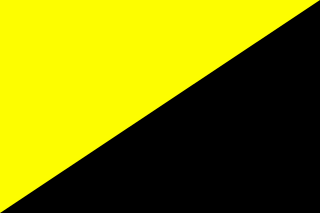
Anarcho-capitalism is an anti-statist, libertarian political philosophy and economic theory that seeks to abolish centralized states in favor of stateless societies with systems of private property enforced by private agencies, based on concepts such as the non-aggression principle, free markets and self-ownership. In the absence of statute, anarcho-capitalists hold that society tends to contractually self-regulate and civilize through participation in the free market, which they describe as a voluntary society involving the voluntary exchange of goods and services. In a theoretical anarcho-capitalist society a system of private property would still exist, and would be enforced by private defense agencies and/or insurance companies that were selected by property owners, whose ownership rights or claims would be enforced by private defence agencies and/or insurance companies. These agencies or companies would operate competitively in a market and fulfill the roles of courts and the police. Some anarcho-capitalist authors have argued that voluntary slavery is compatible with anarcho-capitalist ideals.

Gustave de Molinari was a Belgian political economist and French Liberal School theorist associated with French laissez-faire economists such as Frédéric Bastiat and Hippolyte Castille.
Laissez-faire is a type of economic system in which transactions between private groups of people are free from any form of economic interventionism. As a system of thought, laissez-faire rests on the following axioms: "the individual is the basic unit in society, i.e., the standard of measurement in social calculus; the individual has a natural right to freedom; and the physical order of nature is a harmonious and self-regulating system." The original phrase was laissez faire, laissez passer, with the second part meaning "let (things) pass". It is generally attributed to Vincent de Gournay.
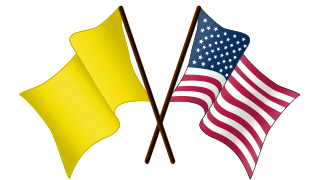
Individualist feminism, also known as ifeminism, is a libertarian feminist movement that emphasizes individualism, personal autonomy, freedom from state-sanctioned discrimination against women, and gender equality.

Leonard Edward Read was the founder of the Foundation for Economic Education (FEE), one of the first free market think tanks in the United States. He wrote 29 books and numerous essays, including "I, Pencil" (1958).
The nature of capitalism is criticized by left-wing anarchists, who reject hierarchy and advocate stateless societies based on non-hierarchical voluntary associations. Anarchism is generally defined as the libertarian philosophy which holds the state to be undesirable, unnecessary and harmful as well as opposing authoritarianism, illegitimate authority and hierarchical organization in the conduct of human relations. Capitalism is generally considered by scholars to be an economic system that includes private ownership of the means of production, creation of goods or services for profit or income, the accumulation of capital, competitive markets, voluntary exchange and wage labor, which have generally been opposed by most anarchists historically. Since capitalism is variously defined by sources and there is no general consensus among scholars on the definition nor on how the term should be used as a historical category, the designation is applied to a variety of historical cases, varying in time, geography, politics and culture.
Criticism of libertarianism includes ethical, economic, environmental and pragmatic concerns. With right-libertarianism, critics have argued that laissez-faire capitalism does not necessarily produce the best or most efficient outcome, and that libertarianism's philosophy of individualism and policies of deregulation fail to prevent the abuse of natural resources. Criticism of left-libertarianism is instead mainly related to anarchism. Left and right-libertarians also engage in criticism of each other.
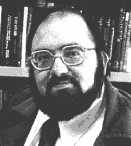
Roy Alan Childs Jr. was an American libertarian essayist and critic.

Jeffrey Albert Tucker is an American libertarian writer, publisher, entrepreneur and advocate of anarcho-capitalism and Bitcoin.
Libertarianism is a political philosophy that holds freedom as its primary value. Many libertarians conceive of freedom in accord with the Non-Aggression Principle, according to which each individual has the right to live as they choose, so long as it does not involve violating the rights of others by initiating force or fraud against them.

In the United States, libertarianism is a political philosophy promoting individual liberty. According to common meanings of conservatism and liberalism in the United States, libertarianism has been described as conservative on economic issues and liberal on personal freedom, often associated with a foreign policy of non-interventionism. Broadly, there are four principal traditions within libertarianism, namely the libertarianism that developed in the mid-20th century out of the revival tradition of classical liberalism in the United States after liberalism associated with the New Deal; the libertarianism developed in the 1950s by anarcho-capitalist author Murray Rothbard, who based it on the anti-New Deal Old Right and 19th-century libertarianism and American individualist anarchists such as Benjamin Tucker and Lysander Spooner while rejecting the labor theory of value in favor of Austrian School economics and the subjective theory of value; the libertarianism developed in the 1970s by Robert Nozick and founded in American and European classical liberal traditions; and the libertarianism associated with the Libertarian Party, which was founded in 1971, including politicians such as David Nolan and Ron Paul.
Right-libertarianism, also known as libertarian capitalism, or right-wing libertarianism, is a libertarian political philosophy that supports capitalist property rights and defends market distribution of natural resources and private property. The term right-libertarianism is used to distinguish this class of views on the nature of property and capital from left-libertarianism, a variant of libertarianism that combines self-ownership with an anti-authoritarian approach to property and income. In contrast to socialist libertarianism, right-libertarianism supports free-market capitalism. Like most forms of libertarianism, it supports civil liberties, especially natural law, negative rights, the non-aggression principle, and a significant transformation of the modern welfare state. Practitioners of right-libertarianism usually do not self-describe by that term and often object to it.

Sharon Presley was an American libertarian feminist, writer, activist, and lecturer in psychology.

For a New Liberty: The Libertarian Manifesto is a book by American economist and historian Murray Rothbard, in which the author promotes anarcho-capitalism. The work has been credited as an influence on modern libertarian thought and on part of the New Right.
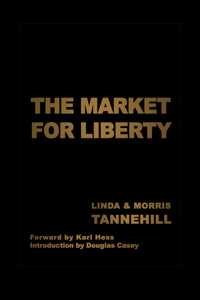
The Market for Liberty is a significant anarcho-capitalist book written by Linda and Morris Tannehill. It was preceded by the self-published Liberty via the Market in 1969. The work challenges statutory law and advocates natural law as the basis for society. It also argues that society would not be lawless in the absence of the state. The Market for Liberty spends a great deal of time outlining how different businesses and organizational structures would interact in a laissez-faire society and how these interactions would create checks which would ultimately keep the tendency for crime low. In keeping with radical free-market principles, the book is skeptical about the potential for violent anarcho-capitalist revolution to bring about good outcomes.
Liberty International is a non-profit, libertarian educational and networking organization based in Dallas, Texas. It encourages activism in libertarian and individual rights areas through the 'freely chosen strategies' of its members. Its history dates back to 1969 as the Society for Individual Liberty, founded by Don Ernsberger and Dave Walter. The previous name (ISIL) was adopted in 1989 after a merger with Libertarian International was coordinated by Vincent Miller, who became president of the new organization.
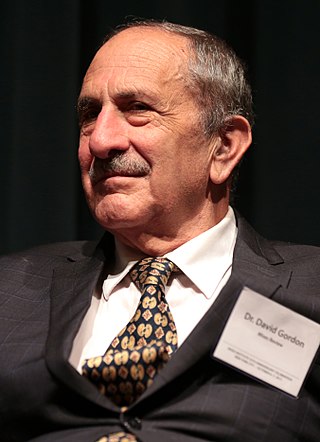
David Gordon is an American libertarian philosopher and intellectual historian influenced by Murray Rothbard's views of economics. He is a senior fellow of the Ludwig von Mises Institute, a libertarian think tank, and is the editor of The Mises Review.
Agora Financial is an American publishing company, based in Baltimore, Maryland, that produces print and email publications, books, and conferences directed toward providing financial advice, commentary, and analysis.
Vince Miller was Canadian libertarian who was one of the founders of the Libertarian Party of Canada in 1975, and later founded Libertarian International in 1980, which by 1989 had merged with Society for Individual Liberty to create the International Society for Individual Liberty (ISIL). Born in Ontario, Miller was the editor of the Libertarian Party of Canada's magazine Libertarian Option.











